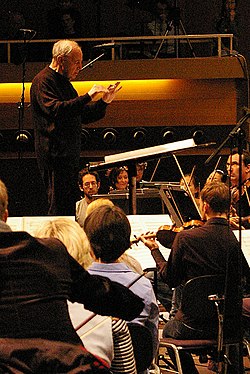History
In 1913, the Donaueschingen Society of Friends of Music was founded under the auspices of the House of Fürstenberg. The idea soon arose to establish a small festival for presenting young and promising artists. A committee of distinguished musicians, among them Ferruccio Busoni, Joseph Haas, Hans Pfitzner, Arthur Nikisch and Richard Strauss, met in 1921 to discuss possible formats for the event.
The first concert was presented just a few months later. On 31 July 1921 the Donaueschingen Chamber Music Performances for the advancement of contemporary music (Donaueschinger Kammermusikaufführungen zur Förderung zeitgenössischer Tonkunst) gave world premiere performances of music by Alois Hába, Ernst Krenek and Paul Hindemith. [4] Three years later, guest composers included Arnold Schoenberg, Anton Webern, and Josef Matthias Hauer, who were among the main representatives of the Viennese twelve-tone technique. [5] In 1925, the festival's scope expanded from presenting only chamber music to include choral works; one year later, the offerings included music for wind orchestra. With experimental forms of music and art such as Oskar Schlemmer's 'Triadic Ballet', the festival encompassed an increasingly wide range of activities and became more and more attractive to avant-garde composers and performers alike.
In 1927, the festival relocated to Baden-Baden. During the years 1931–1933, 1935, 1940–1945, and 1948–1949, all concerts were cancelled due to the overall national and international political situation. [6] Instead of the original chamber music series, the National-Socialist party organized its own concerts from 1933 to 1935, called 'Donaueschingen Musical Celebration' or 'Old and new chamber-music from the Swabian-Alemannic region'.
After the war, the Society of Friends of Music was able to re-establish the festival under the name Donaueschingen Festival of Contemporary Music. A cooperative agreement between the Südwestfunk in Baden-Baden and its orchestra shifted the program emphasis to larger orchestral works. In 1951, Olivier Messiaen and his student Pierre Boulez offered new compositions, [7] along with older works by Hindemith and Béla Bartók.
In 1972, the Karl Sczuka Prize for Hörspiel (radio play) was awarded for the first time during the festival. Since 1993, every festival has its own theme.
In 1998, South-West German Radio Baden-Baden became successor of Südwestfunk.
The 2020 Donaueschingen Festival was canceled on short notice due to the COVID-19 pandemic. [3] [8]
The 2021 Donaueschingen Festival features the Donaueschingen Global Project.
This page is based on this
Wikipedia article Text is available under the
CC BY-SA 4.0 license; additional terms may apply.
Images, videos and audio are available under their respective licenses.
